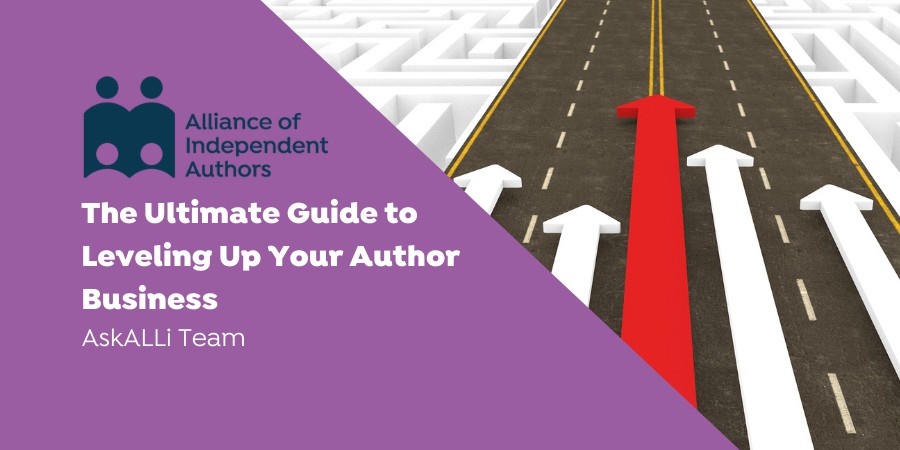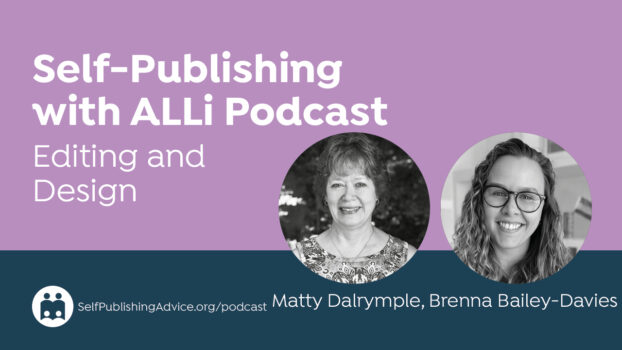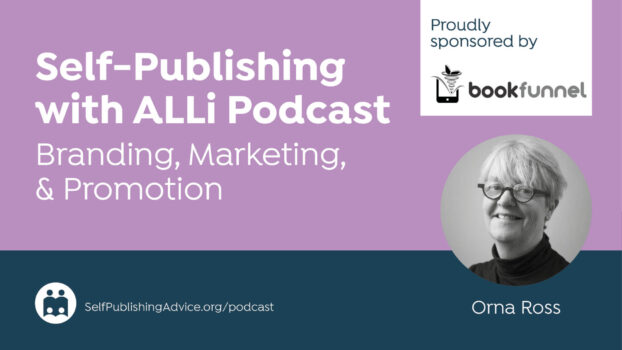You've been publishing for a while now and you have a few books to your name. You're making some money and you want to make a go of being a full-time author. This week, the Ultimate Guide from the Alliance of Independent Authors is for advanced self-publishers and dives deep into business growth and development. This is the Ultimate Guide to Leveling up your Author Business.
For authors, the real difference between self-publishing one's own books and licensing rights to a single publisher is business. An indie author is not a professional, a careerist, or a freelancer but the owner of a creative business. The creative director bank of intellectual property that delivers sales, commission and royalty income, and grows over time.
There are those who start out thinking about it like this but for most authors, this sneaks up on us. One day, we're doing our best to write and finish a book, next we're deciding to self-publish amd take our books to our readers ourselves, and then one fine day we look around and find we're making some money. We have customers and we owe taxes. Somehow, we're in (author) business.
Then what?

Orna Ross, Director of ALLi
Owning your own author business is one of the greatest jobs in the world. You get to make your living doing what you love, spinning poetry, prose or stories from your imagination into books and other products and projects that readers want to buy. You get to set your own schedule, make your own decisions, decide what work you will and won't do. You get to be as independent as it's possible to be in this world: no boss pushing you around, no film editor chopping away your most meaningful scenes, no publisher putting your book out under a cover you loathe.
You are completely free to make your own commercial and creative choices.
But as Eleanor Roosevelt (and Spiderman's Uncle Ben) once said “with great freedom comes great responsibility”. If you want this life, you have to become skilled in three very different activities: writing, publishing and business. You have to fulfil the expectations of your readers and followers, and you have to figure out how you're going to get properly paid and not find all the hours of every day consumed by work.
The usual trajectory is to muddle along for a while, learning by doing, taking advice and modeling what we see other authors do, having some scores and some fails, a little overwhelmed, a little overworked. This mirrors what happens when starting out in any business. At the beginning, that's just what you should do: follow quick fixes, do things cheaply, make some progress.
Any kind of progress is good at the beginning, says Orna.
The most important thing at the start is to keep moving, not to give up, not to decide “it isn't working”. You don't know enough yet to make that call.
Exploration and experimentation is the attitude to hold. You're trying things out, so you can see what works and what doesn't for you (which may be quite different from others). Keep writing and keep exploring and experimenting with genre and covers, marketing methods and business options. See what works, make adjustments accordingly.
Then one of two things happens. You get clarity on what you want to achieve and understand just how your business needs to upgrade if you're to flourish in the way you want. Or you find yourself with bits of your business breaking e.g. you get told your autoresponders are out of date by a reader, you can't seem to get some key pages set up on your website, you're not sending your reader newsletters on time (or at all), you're not on top of your finances, you don't have a system in place to deal with the mounting administration…
(Yes, we have experienced all of the above.)
One way or the other, you realize: you're going to have to level up your author business.
When Do You Start Thinking About Leveling Up your Author Business?
The indicators that it's time to level up are multi-faceted.
- Has everything has speeded up to a crazy extent and you feel overwhelmed or out of control?
- Or are your processes so slow that you're struggling to complete important work?
- Has the amount of engagement and reach out from your audience increased to the point where you can't answer everyone?
- Are opportunities coming up that you can't say yes to because you've already maxed out your “yes” capacity and you can't take on more?
These are tell-tale signs you're in need of a pause moment to refresh and level up your business.

ALLi blog manager, Sacha Black
Sacha says:
“I came to a point this year where I knew I needed to stop and give myself some headspace to review my business foundations. While my author business was growing financially, I was drowning in administration, there were lots of behind the scenes processes that were broken or partially working, and I was finding myself saying “I hate doing such and such”.
The whole point of my this life and being an indie is that I've created a business that makes me happy. So I shouldn't ever say “I hate” anything in my business. And if I do, then I need to outsource it.
That's how I knew I needed to strengthen my business, cut the rubbish out, and polish the back end. Which is why I'm spending the last quarter of this year working on just that.”
Alternatively, you've had a good start and you're making some money but you can see already that if you don't get better processes in place, you're not going to be able to deliver what you want to deliver.
Leveling Up your Author Business: A Creative Process
Sometimes when they get to this stage–or whenever they think about their business–writers switch out of their usual way of doing things and try to force themselves to be more utilitarian and functional. This is fine if you enjoy being in that kind of mind mode but the joy of creative business is that it doesn't have to be mechanistic and self-flagellatory. You're not a machine and you don't have to be, and trying to think and act in ways that go against the grain are not useful in creative, passion-powered businesses. And not necessary.
We know that getting into and staying in creative mode is essential for us to write well. The good news is our hard-won creative skills can be applied to great effect to our publishing and business activities too.
The wonder of running a creative business in the digital age is that most of the publishing and business functions that require a mechanistic approach can now be handled by tools and tech, or can be outsourced.
Digital micro-publishing is a creative business. You don't need to beat yourself up, do everything in a flurry, or do anything you don't want to do in order to succeed. You don't have to be (what we've heard some authors say about themselves) “the worst boss you've ever had”. What you need is to know yourself, know what you want to create, and know what's optimal for you right now. And know how to apply your own creative process to your own creative business.
The thing that's most wonderful about creativity is that it's always original. Give a hundred writers a prompt and you'll get a hundred completely different stories. It's the same with author business. When you operate from the creative process, your business will be as unique as you.
In order to publish and sell one or more books, we've already brought ourselves through the first stages: setting the intention, incubating and investigating the idea. If we're up and running and earning any money at all, it's the equivalent of having done our first draft. Now we can grow and develop and deepen.
Leveling Up your Author Business: Set Creative Intentions that Challenge you
Leveling up means coming out of your comfort zone. It means going back to your original creative intentions when you first set out to self-publish and seeing what still holds and what's moved on, now you know so much more.
Take a no-holds-barred look at your business.
- Is it where you expected it to be at this point?
- If not, what got in the way?
- Are you taking business seriously for the first time?
- Where do you want to go?
- What kind of business do you want to run?
- What's your definition of success?
- Where will you start the leveling up process?
If you're feeling daunted, or flat, or overwhelmed, go find your readers. Hang out where they hang out online. Listen to the conversations they're having and then incorporate that change into your marketing. Inspire and excite yourself again
Growth potential is everywhere in and around a business. It’s in your product offerings, your marketing, your reader service and retention. This process of selection—of deciding what we want to do more of and what we want to let go, what we want to delegate and what we want to delete, what we want to elaborate and what we want to clarify–is shaped by our passion and sense of purpose as a writer, our values as a person, and our financial needs, goals, and intentions.
Block out some time in your diary to map out some new intentions for your author business. Look to grow in creative ways that offer real benefit to your readers. Think about the three aspects of your business: writing, publishing and business. Ask yourself, What’s the next step I need to take to move this aspect of my business foward. Set an intention (big pictures) and some goal (time based tasks) for each aspect that makes you feel satisfied. Write them down.
Pick the one thing that would have the most effect on leveling up your author business wearing three hats: maker (producing the books, other products, and publications that surround them), manager (improving the processes that deliver the products), and marketeer (marketing and promotional activity that will sell the products). Write down those three top things. Have a think about the resources you'd need to make them happen.
Now magnify each of these three by asking what you'd have to do to deliver a result that was ten times greater — not because that's what you actually intend to do but because thinking bigger takes you out of habitual thought. Also, some interesting research
Now work your way back to intentions that make you feel happy and raring to go, that seem achievable and rewarding. Write them down.
Leveling Up your Author Business: Trimming the Fat
With so many new ideas always coming at us, it can be hard to stay focused. Yes, new ideas are great. But not all of them should be followed up. And not everything you've started already should be kept.
Which part of your business has the lowest return on investment? Which has the highest? It makes sense to cut out the low rollers and focus your energies on driving more readers to your best offers, or crafting even better offers.
- Identify your preferred platform. Yes, our books should be available everywhere and we use a combination of direct uploads to distributors like Amazon, Apple, Barnes & Noble, Google Play, Kobo, and Ingram Spark for print, together with aggregators like Draft2Digital, PublishDrive, and StreetLib, to reach as many outlets as possible. But we need to choose a preferred outlet for the sales we drive directly ourselves. It could be Amazon, to benefit from their algorithm, it could be your own website, or another one of the other Big 5 listed above, or one of the platforms that supports indie bookstores like Bookshop.org.
- Identify your poor performers, from a business perspective. What do you want to do about them? We all have a favorite book, or series, or line that isn't doing well and maybe taking valuable attention away from your higher-performers. This underperforming darling might not be a produce. It could be a reader, an assistant, or a process? How are you going to deal with it–often the answer is to delete.
- Think long term: There's also an element of future-proofing your business that will help you decide what should stay and what should be cut. For example, is the business you're running now what you want it to be in five or ten years? Do you want to take a side step into another or adjacent field? If so, should you be doing something now to help further that?
- Take every opportunity to simplify and clarify. Many indie author businesses are weighed down with too much complexity. Narrow down, lighten your load, focus your attention.
Leveling Up your Author Business: Growing Pains
When you're growing, you're likely to experience growing pains. The most important thing to know about such pains is that they’re not really caused by growth. Doctors don’t know where they come from but they do know that the pains don't happen where growth is occurring, or during times of rapid growth.
According to Mayo Clinic: Growing pains: Symptoms and Causes overuse is thought to be the most likely cause of these pain–they are more common in active children and too much running, climbing and jumping can be hard on a child's musculoskeletal system–and a low pain threshold may also be a factor. It’s the same with writing and publishing. The pain is not caused by the growth, as we may be telling ourselves. It arises from doing too much, too fast. Or from a low pain threshold, thinking it should all be easier than it is.
Creative writing, creative publishing, creative business are long-term projects. Trying to rush towards some notional finishing line is one of the commonest cause of unhappiness and substandard work in the indie author community.
A book is a complex creation that calls for emotional as well as intellectual labor and growth. So an author business. This what makes it rewarding. Dreaming is easy, wanting is easy, talking about what you could do, or imagining the work done, is easy. But there’s not much payoff. After a while, if you don’t add in action, dreaming, wanting, and wishing begin to hurt.
The dreamers, wannabes, posers, and pretenders are not happy. They want the reward without the work but it’s the size and complexity of your writing and publishing tasks that make them valuable—to your readers, and to you.
The author-publisher who is at the deepening stage of their business needs to take a deep breath and take the pressure off. The work you are about to do might feel like it's slowing you down but you are going to reap the rewards for years to come.
Leveling Up your Author Business: Three Layers
There are three layers to leveling up. The first is foundational: your business model and income streams. The second is what goes on behind the scenes, how you manage the necessary work, and the administration that accompanies it: your process. Once you have that sorted, there's the front end: your branding and communications with readers, influencers and other interested parties.
1. Products and Services: Your Income Streams
When we say income stream we don't mean having books in different formats, ebooks and paperbacks and audio. Yes, you could say these are different “streams” of income and you'll probably break these out in any analysis of your income, but what we're referring is regular sources of income from very different sources.
So rather than having just books in all their formats, multiple streams of income for an author takes in income from things like online courses, speaking gigs, merchandise, affiliate marketing, rights licensing to name but a few examples.
Multiple streams of income help to ensure your financial security. If you only have books as a source of income and you're only publishing on one platform, what happens if that platform is disrupted? Or they decide to shut your account.? Overnight your business is gone, your income is gone, and your ability to put food on the table and keep the roof over your head is gone. If you have alternative sources of income then yes, some of your income is gone and it might be a tighter few months but you'll survive.
In order to decide what income streams to create, you need to know the author business model you want to run.
As always, it comes down to personal choice. If you want to be writing fast and publishing fast and you're not really bothered by income streams because you want to capitalize on a hot market right now, then working on creating merchandise or speaking gigs isn't important. Those things can be cut in favor of giving you maximum time to write.
In reviewing income streams, ask yourself the following:
- Are your income streams making money?
- Are they making sufficient money for the amount of time you're spending on sustaining and running them?
- Which streams bring you most joy?
- Are you happy with the business model you're running?
- Are you saying yes to “opportunities” that are unpaid? Is it time to stop working for free/low-pay? What criteria do you use to select what gets a “yes” from you?
2. Processes, Administration, and Outsourcing
We've written before here of the three hats an indie author must wear to run a successful author business. This deepening and levelling up work is done wearing your manager hat. The manager makes the business a safe and nurturing environment for the maker and the marketer.
— your strengths and weaknesses and the threats and opportunities that surround you.
3. Branding and Communications.
Once you've reviewed and assessed your business foundations and processes, now look at the front-facing side. How do you polish and perfect the business face you're showing your audience and customers?
Do you have a set of brand guidelines? Maybe you came to create a social media post and couldn't remember the font you used. Is the font on your book covers different to the font on your images which is also different to the font on your website? It's time to create brand identity guidelines.
Believe me, it may feel like a redundant exercise, but when you're up against the wall and have 8000 things to remember, having core business information written down like this will help you from making a mistake. And it's also useful when dealing with the publishing professionals you work with, from virtual assistant, your designer.
A. What to include in your business branding guidelines
- Color palette. Do you have certain colors in your business that you want associated with you and your business? Include the RGB and HEX codes in your guide. If you don't know how to create a palette, you can use a free palette generator from Canva here.
- Specific fonts. Use these across all your media, social images, website and any other places you use digital text and include them in your brand identity guide.
- Do you have a logo for your publishing imprint? Include that in your guidelines.
- Do you use swear words or sarcasm, dad jokes or perhaps sweet, clean language? If there are particular nuances to the tone or voice that represent your books and your business, identify and include these.
The AskALLi team has a comprehensive post on branding right here.
B. Author Website
Websites can go out of date very quickly and without you realizing. It's important to keep them fresh and up to date even if that means taking a couple of days out to update them every few months.
- Is your bio page up to date?
- Do you have redundant links or information?
- Are your social media links up to date? Maybe you stopped using a profile or would prefer people to contact you using a particular way.
- Do you have a link to your mailing list with your reader magnet?
- Do you have services you're no longer running but haven't taken down their pages?
- Do you have old blog posts, information or pages that need deleting because they're no longer consistent with your image and business? It's time to get rid of them.
- Do you have a bookstore to sell your own books?
If you've yet to set up a bookstore on your site, then now is the time. There are multiple benefits to setting up a bookstore on your website, not least of which is the fact you earn a higher royalty, have the ability to create discount codes specific to your audience, campaigns or events. If you're unsure where to start building your website, then check out our ultimate guide to selling books on your website here.
C. Reader Mailing Lists
The AskALLi team recently ran a three-part series on setting up, growing and managing your mailing list. If you missed any of the posts, you can catch up here:
If you don't have a mailing list, then you really do need to set one up. It's a foundational marketing tool for any indie author or small business. If you have a list but you don't have a reader magnet, create a reader magnet for it. If you have a reader magnet and a list but are struggling for growth, then consider advertising and promotional opportunities. Do check out the articles above for tips, tricks and tactics for leveling up your mailing lists.
Get help
Buy yourself some productivity by bringing onboard talented people to do the things you’re not passionate about.
Do a time audit. Where is your time going? How much is spent dealing with administration or tasks that can be done by others vs core time creating books or other products? If you find you're weighted too heavily on the administration side, then it may be time to outsource some work.
It may feel scary or self-indulgent to hire a virtual assistant spend money on, but You don't have the clarity of a freelancer who hires themselves out at 50 an hour who knows it makes sense to hire somebody else at 25 an hour to do tasks that can be done by another. You can't be sure, upfront, how much a book is going to make. And if you're in the early stages of your business it can be hard to have the belief that you'll master the marketing skills that will bring your books the revenue you need to justify a hire.
What happens in practice is the very act of hiring, and having that outgoing, makes you more serious about your author-business, and more determined, and more likely to succeed.
Sacha says:
“I'd been putting off outsourcing work for a long time because I was afraid of both spending the money and giving access to my business to others. I'd spent years growing my business from the ground up totally by myself. So handing access over to someone else was terrifying. But I knew it was time to outsource work when a friend asked me if I knew what I earned per hour. I didn't but I gave it a solid guess. She then pointed out a VA would cost me much less per hour and if I gave them the admin work, I'd be free to do more creative work which would ultimately lead to a bigger per hour income. It was an excellent point.
What's more, when I did hand over work to a VA, it took them 2 hours to do all the administrative work I'd been spending 5 hours on. The other things I realized is that in handing over tasks, there were some things I actually didn't want to pay for.
If that was the case, why was I doing the work in the first place? So they got thrown out.”
When you first hand over work to a virtual assistant, bear in mind that there will be a transition period. You won't find you're immediately more productive. In fact, your pace of progress is likely to stall a bit while you invest time in training your assistant to deliver work to your standards and checking for a few weeks that they're okay.
There will also be an adjustment period where you also get used to having more time again, your production timescales will need to shift to adapt.
In splitting work out with a VA, you may find you want to change how you're working. Do you have systems and schedules in place? Working with a VA on a podcast for example, means you can't just leave everything to the last minute. Your VA will be relying on you to deliver your half of the podcast, blog, social media scheduling etc on time.
The chances are, you won't be their only client. Which means you need set days and times for working and delivering work to your VA and you scheduling or batching work to deliver to them. All these things take a little while to adjust to. So expect a short delay before you reap the rewards of your time and money investment.
Once they're trained and your processes have adapted, you'll start to motor. You may well, like so many authors before you, find yourself hiring somebody else now to help with a different aspect of your work.
Don't forget to observe and enjoy your new time, remembering what it was like when you had to do everything yourself.
Leveling Up your Author Business: Where Do you Stop?
An author business is not like a book. With a book, you come to a point where you write The End. With your author business, while you may have an exit strategy, it's far more likely that you just want to keep on doing this for as long as you can, and retirement is not in your plans. So how do you know when you're done? When do you get you say, “I've done it! I've leveled up my business!”
Won't there just be another level at which to aim upwards then?
It's important to have measures in place so you know when you've hit them. Otherwise it can all feel like it just keeps rolling on, with a never-reached goal always receding into the distance: a recipe for unhappiness and burnout.
So set yourself some intentions and goals so when you've done enough deepening and refining you can say: “Yay! My author business is meeting its targets.” That should be a huge moment for you.
At that point you may be happy to coast along at that level for a while, or you may decide to set new intentions and goals at a higher level. It's up to you.
What you choose as your measures of success is also up to you but whatever your personal preferences and circumstances, there are some key indicators (which Orna Ross in Creative Self-Publishing calls the 4 Ps): productivity, profit, purpose and personal happiness. Orna says:
The outer measures of productivity and profit give us endpoints to travel towards but the inner measures of purpose and personal happiness is what will keep us connected not just to what we’re creating, but how we’re creating. It’s good to have an end in mind but in the end what counts is how you travel.
Use the four Ps to monitor where you find yourself now, and to measure your progress as you deepen and develop and level up your author business.
- Productivity: Your output. Measure words completed (writing productivity) and books published (publishing productivity).
- Profits: Your financial rewards. Measure money paid across to yourself after all your publishing expenses are paid (personal bank deposit).
- Purpose: Your influence and impact. Measure platform, reach and engagement with your mission –that which what is most meaningful for you as a writer (book sales, follower numbers, and comments, conversations, emails ).
- Personal satisfaction: Measure your pleasure in your work. Let’s give it a fancy title, and call it your creative happiness quotient (CHQ). Take a reading from one to ten based on your internal self-observation of your CHQ, 1 being misery and 10 creative bliss.
Use the 4Ps in conjunction with the array of analytic tools now at our disposal in digital publishing to continuously evaluate and upgrade the aspects of your business that most need your creative attention.
Leveling Up your Author Business: Conclusion
Finally, your business will grow best if you give yourself time to think. Carve out time every week to put thought into your business, to consider your creative intentions and accomplishments, to list challenges, threats and opportunities you're facing and possible solutions.
Get yourself to a quite place. Once you’ve spent time thinking alone and have some ideas on paper, seek others’ opinions.
Recharge your brain in the way you like best. Meditate and exercise to foster new ideas.
Leveling up your author business is not a quick-and-easy process. When you've spent years building up your business alone, it can be hard to acknowledge you'd do well to get some help and that other people can do things better. These beloved businesses are ours and we've slaved over them, with our sweat and sweat equity.
Retaining control is an innate part of being an indie author which is why so many of us find letting go of control a tricky mindset shift to negotiate. It's also tricky because leveling up requires you to stop, take time to review what you're doing and assess what's working and what's not. It requires you to look to the future and make concrete plans, not something we all enjoy doing.
And meanwhile books still need to be written and produced.
But this isn't just about ensuring you can spend the next X number of years working on your core business. It's about you and your family's future. It's about safeguarding your financial security, and ensuring you're shaping the future you actually want. That's a privilege.
We are extremely lucky in this business, we have the ability to craft and shape our businesses in the form that makes us happy whether that's through employing people, writing fast, pushing income into investments in other industries or something else entirely.
If you're interested in creative business planning, Orna Ross runs a small-group private planning membership through Patreon (see brochure here)
Join this Facebook group for accountability. Each Monday we set our intentions wearing three hats an indie author must wear: maker, manager and marketeer. Each Friday we log our accomplishments.





Excellent article with so many important points to consider. I liked how you highlighted all the different questions we should ask ourselves as indie author business owners and how to know which tasks it might be best to get help with. Thank you for including the list of “how to know” whether it’s time to seek outside help as well. Very insightful–I appreciate it.
This is a very interesting article… thank you for sharing.
Excellent article. Thank you for sharing it with us.